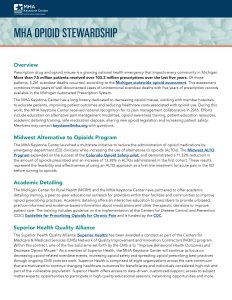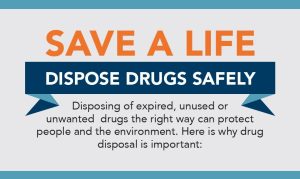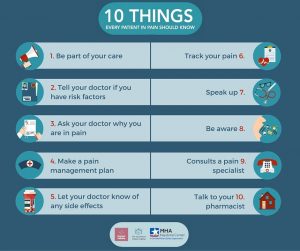Tools for Patients
Medication Disposal Toolkit
Medication Disposal Tool Order Form ›
10 Things Every Patient in Pain Should Know
Pain Management Guide
Podcast Covers Opioid Crisis in Michigan
An episode of the MHA’s podcast, the MiCare Champion Cast, covered the opioid epidemic and new steps being taken to help prevent opioid abuse and overuse. The episode featured interviews with Paige Fults, director, advocacy, Michigan Health & Hospital Association; Kim Gaedeke, acting deputy director, Department of Licensing and Regulatory Affairs; and Robert Nolan, DO, director of emergency medicine, Lakeland Health.
Combatting the Opioid Epidemic
Prescription drug and opioid misuse is a growing national health emergency that impacts every community in Michigan. From 1999 to 2016, the total number of overdose deaths involving any type of opioid increased more than 17 times in Michigan, from 99 to 1,689, according to the Michigan Department of Health & Human Services.
The MHA Keystone Center has a long history dedicated to decreasing opioid misuse, working with member hospitals to educate patients, improve patient outcomes and reduce healthcare costs associated with opioid use.
Emergency Department Medication for Opioid Use Disorder – Upcoming Events
The Emergency Department (ED) stands at the frontlines of the opioid crisis, encountering patients battling substance use disorder every day. While addressing acute medical needs is crucial, healthcare professionals and organizations can – and should – be more involved in treating opioid use disorder patients beyond immediate stabilization. The Michigan Health & Hospital Association (MHA) Keystone Center is pleased to collaborate with the Community Foundation for Southeast Michigan (CSEFM) and the Michigan Opioid Partnership (MOP) to provide free, peer-to-peer learning opportunities with clinical consultants, including office hours, learning collaboratives and round tables to increase awareness for ED Medication for Opioid Use Disorder (MOUD) work and decrease opioid-related injury and death in Michigan. These offerings are dynamic, virtual spaces for experts to come together to:
- Beat the stigma: Raising awareness, educating the public and fostering a compassionate environment where patients feel safe seeking help.
- Ask tough questions: No question is off limits as we dive into the successes and challenges of ED-based MOUD, and work to assist you in implementing ED MOUD in your hospitals.
- Share best practices: Let’s learn from each other’s successes and troubleshoot challenges collaboratively.
- Forge impactful partnerships: Connect with specialists, organizations and other leading experts to build a robust support network for patients and clinicians.
To see upcoming virtual office hours, learning collaborative and confidential round table dates, please visit the events page on the member portal.
Resources for Hospitals and Physicians
The Start Talking Form is designed to satisfy patient education and parental consent regulations regarding opioid prescriptions under Public Act 246 of 2017 which became effective June 1, 2018. Download the Word template version of the form or access it under the Prescribers tab on the MDHHS’s website.
Public Act 248 of 2017, which became effective on June 1, 2018, requires a licensed prescriber to register for MAPS before dispensing or prescribing a controlled substance. The state has developed a mechanism to verify if a licensed prescriber has registered for MAPS. To assist in ensuring all needed information is provided to state, the state has created a CSV template as a guide. Once the list is filled out, email a copy to LARA for verification.
The Michigan Opioid Legislation Hospital Compliance Checklist was created to help guide MHA-member hospitals through the requirements of a package of bills signed into law in December 2017 in response to the opioid epidemic. Disclaimer: This document does not constitute legal advice. Please note that guidance from the state of Michigan is subject to change, and organizations are encouraged to contact legal counsel for legal advice.
The Michigan State Medical Society can also be used as an opioid epidemic resource.
Resources for Patients
A state law allows patients to direct health professionals to not administer opioids to them through the Nonopioid Directive form. The form can be downloaded from the Michigan.gov website, and additional resources are available to help with opioid addiction on Michigan’s Opioid Addiction Resources website.
One of the best ways individuals can fight the opioid epidemic while protecting the environment is to properly dispose of unwanted and expired medications. The resources below are ready to share with patients.




